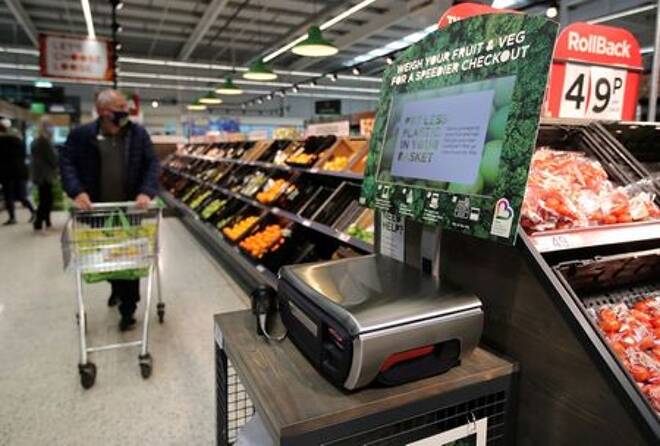Advertisement
Advertisement
More Pain for British Consumers as Grocery Prices Rise
By:
LONDON (Reuters) -British grocery prices increased 1.7% in the four weeks to Oct. 3 year-on-year, market researcher Kantar said on Tuesday, adding to pressure on households already facing soaring energy bills.
With inflationary pressures mounting in the British economy, one Bank of England policymaker on Saturday told households to get ready for early interest rate rises.
A survey published on Monday by pollsters YouGov and consultancy CEBR meanwhile said consumer confidence has fallen to a five-month low.
Kantar said prices are rising fastest in markets such as savoury snacks, cat food and crisps while falling in fresh bacon and vegetables.
“In real world terms, the average household had to spend an extra 5.94 pounds ($8.08) on groceries last month than they did at the same time last year,” said Fraser McKevitt, head of retail and consumer insight at Kantar.
“The typical household spends 4,726 pounds per year in the supermarkets, so any future price rises will quickly add up.”
Kantar first reported grocery prices starting to rise again in August. They rose 1.3% in its September report.
However, Tesco, Britain’s biggest supermarket group, said last week that its prices were still falling.
Kantar said UK grocery sales fell 1.2% year-on-year in the 12 weeks to Oct. 3, but were higher than pre-pandemic times – up 8.1% compared with the same period in 2019.
It noted that some shoppers’ minds are starting to turn to Christmas, with sales of Christmas puddings up 76% year-on-year in the latest four weeks, sales of toys up 5% and sales of gift wrapping products up 10%.
“It’s important to say, however, that these are still relatively small numbers and anxiety around supply issues has not translated to panic buying – festive or otherwise,” said McKevitt.
Much of the country did, however, see panic-buying of fuel last month as a shortage of tanker drivers led to disruption of supplies.
The reduced availability of fuel meant people limited the number of trips they made to supermarkets.
The average household made 15.5 store visits in the past four weeks, the lowest monthly figure since February.
Conversely the proportion of groceries bought online rose to 12.4% from 12.2% in September.
Tesco, which raised its profit outlook last week, saw its market share increase 0.6 percentage points over the 12 weeks, hitting 27.5% – its highest level since February 2019.
While sales at Tesco rose 1.2%, they fell at major rivals – Sainsbury’s, Asda and Morrisons.
Separately on Tuesday data published by the British Retail Consortium said that British shoppers increased their spending in September at the slowest pace since January.
For a look at all of today’s economic events, check out our economic calendar.
(Reporting by James Davey; Editing by Catherine Evans and Louise Heavens)
About the Author
Reuterscontributor
Reuters, the news and media division of Thomson Reuters, is the world’s largest international multimedia news provider reaching more than one billion people every day. Reuters provides trusted business, financial, national, and international news to professionals via Thomson Reuters desktops, the world's media organizations, and directly to consumers at Reuters.com and via Reuters TV. Learn more about Thomson Reuters products:
Latest news and analysis
Advertisement
